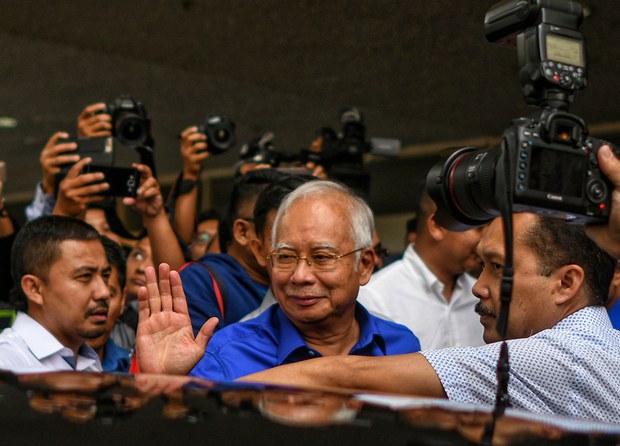Malaysia: Najib Razak Accepts Political Downfall in Coalition’s Landslide Defeat
2018.05.10
Kuala Lumpur and Washington
 Malaysia's outgoing Prime Minister Najib Razak waves after a news conference at Putra World Trade Center in Kuala Lumpur, May 10, 2018.
Malaysia's outgoing Prime Minister Najib Razak waves after a news conference at Putra World Trade Center in Kuala Lumpur, May 10, 2018.
Najib Razak took a spectacular downfall on Thursday, shedding his “political blue-blood” as Malaysia’s prime minister and conceding defeat as he pledged to accept the verdict of the people.
Najib, who has masterfully endured controversies during his decade in power, gave his statement as stunned Malaysians woke up after the opposition bloc pummeled the ruling coalition Barisan Nasional (BN) in the May 9 general election.
“I accept and my friends all accept the verdict of the people,” he said, according to the translation of his address.
But his next sentence irked Mahathir Mohamad, who led the opposition coalition to victory.
“And because no party has gotten a simple majority, therefore the king will be making a decision as to who will be the prime minister,” said Najib, who also accused his electoral rival of issuing seditious statements.
Mahathir, 92, took his oath at the royal palace in Kuala Lumpur on Thursday, becoming the world’s oldest elected leader.
Najib’s statement despite his humiliating electoral defeat drew attention to his unpopular moves while leading the Muslim-majority nation.
Political dynasty
The 64-year-old Najib, eldest son of a former prime minister and nephew of another, consolidated his political grip based largely on his adroit financial skills as a British-trained economist.
He deployed allocations for his electoral constituents, spread a largesse among Malay landless families and pumped voter support though an annual cash-handouts program.
That political strategy, analysts said, allowed Najib to build deeply embedded support at the grassroots level, giving the ruling party a powerful voter base among teachers, military personnel and rural settlers.
But BN, the coalition that conquered every election since the country gained its independence from Britain 61 years ago, did not gain from Najib’s political decisions, analysts said.
“Najib is a liability. His narcissism cost them the election,” Bridget Welsh, a John Cabot University analyston Malaysian politics, told CNN. “He used racial politics and money, like he did in 2013, but it did not have the same traction.”
It could not be determined how the long-running allegations of corruption linked to the state fund 1Malaysia Development Berhad (1MDB) influenced the Malaysian vote.
But the electoral bloodbath that led to BN’s defeat was sparked by 1MDB.
Mahathir's decision to forge strategic electoral pacts with sworn enemies, including Anwar Ibrahim – a former ally who became his nemesis who became his ally again – reflected distrust of Najib after the 1MDB scandal broke.
In August 2017, the U.S. Department of Justice announced it was pursuing criminal action against those involved in the misappropriations and fraudulent diversion of funds from 1MDB, an entity wholly owned by the Malaysian government.
DOJ is trying to recover more than $1.7 billion in real-estate and other assets allegedly siphoned off through complex transactions from 1MDB, which Najib formed in 2009 ostensibly to pursue projects that would benefit Malaysian citizens through development projects.
Court documents allege that about U.S. $681 million of 1MDB funds were diverted into Najib's personal bank accounts ahead of the 2013 general election, but Najib said the money came as a political donation from a member of the Saudi royal family.
In an April 24 interview with Bloomberg News – his first one with foreign media outlet in years – Najib predicted he would prolong his rule, as he discussed the 1MDB embezzlement scandal that spawned probes in at least six countries, including Switzerland, United States and Singapore.
“You cannot just accuse somebody of being a thief unless there is evidence,” he said. “I stand by it: There’s no wrongdoing.”







